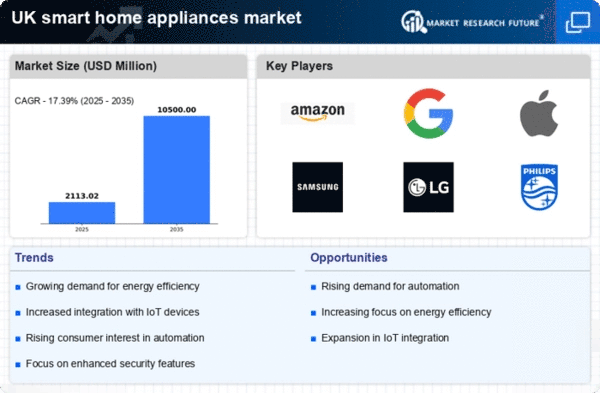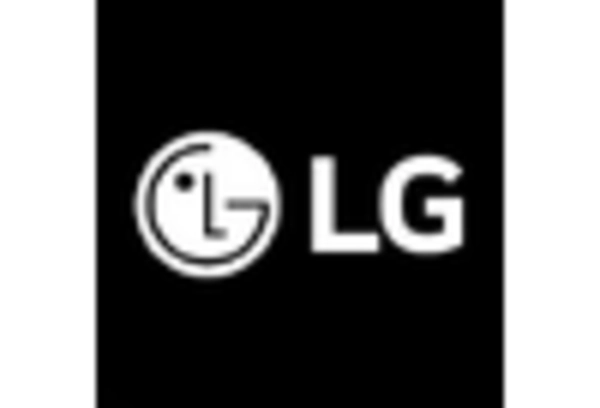Sustainability Trends
Sustainability trends are increasingly influencing the smart home-appliances market. With growing concerns about climate change and environmental impact, consumers are gravitating towards energy-efficient appliances that reduce their carbon footprint. In the UK, government initiatives aimed at promoting sustainability are encouraging households to adopt smart technologies that optimize energy consumption. For example, smart thermostats and energy monitoring systems can lead to energy savings of up to 30%, making them attractive options for eco-conscious consumers. This shift towards sustainability is not only beneficial for the environment but also aligns with the economic interests of consumers looking to reduce utility bills. As a result, manufacturers are prioritizing the development of eco-friendly products, thereby driving growth in the smart home-appliances market.
Increased Urbanization
Increased urbanization is a significant factor impacting the smart home-appliances market. As more individuals move to urban areas, the demand for efficient and space-saving appliances rises. Urban dwellers often seek solutions that enhance convenience and optimize living spaces, making smart appliances an appealing choice. The UK has witnessed a steady increase in urban population, with projections indicating that by 2030, over 80% of the population will reside in urban areas. This demographic shift is likely to drive the adoption of smart home technologies, as consumers look for ways to simplify their lives increasingly compact living environments. Consequently, the smart home-appliances market is expected to expand as manufacturers tailor their offerings to meet the unique needs of urban consumers.
Rising Disposable Income
Rising disposable income among UK households is contributing to the growth of the smart home-appliances market. As consumers experience an increase in their financial capacity, they are more inclined to invest in advanced technologies that enhance their quality of life. Recent data suggests that disposable income in the UK has risen by approximately 4% over the past year, allowing consumers to allocate more funds towards home improvements and smart technologies. This trend is particularly evident among younger demographics, who are more likely to embrace smart home solutions. As disposable income continues to rise, it is anticipated that the demand for smart appliances will increase, further propelling the growth of the smart home-appliances market.
Growing Consumer Awareness
the market is experiencing a notable surge in consumer awareness regarding the benefits of smart technologies. As individuals become more informed about energy efficiency, convenience, and security, the demand for smart appliances is likely to increase. Recent surveys indicate that approximately 65% of UK consumers are now aware of smart home technologies, which is a significant rise from previous years. This heightened awareness is driving consumers to seek out products that not only enhance their lifestyle but also contribute to energy savings. Consequently, manufacturers are responding by innovating and marketing their products more effectively, thereby expanding the smart home-appliances market. The increasing availability of information through online platforms and social media further amplifies this trend, suggesting that consumer education will continue to play a pivotal role in shaping the market landscape.
Technological Advancements
Technological advancements are a critical driver of the smart home-appliances market. Innovations in artificial intelligence (AI), machine learning, and the Internet of Things (IoT) are enabling the development of more sophisticated and user-friendly appliances. For instance, the integration of AI allows devices to learn user preferences and optimize their functionality accordingly. In the UK, the market for smart appliances is projected to grow at a CAGR of 15% over the next five years, largely due to these technological improvements. Furthermore, advancements in connectivity, such as 5G technology, are enhancing the performance and reliability of smart devices, making them more appealing to consumers. As technology continues to evolve, it is expected that the smart home-appliances market will witness an influx of innovative products that cater to the diverse needs of consumers.















